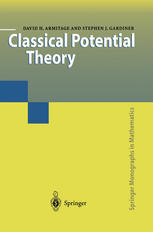

Most ebook files are in PDF format, so you can easily read them using various software such as Foxit Reader or directly on the Google Chrome browser.
Some ebook files are released by publishers in other formats such as .awz, .mobi, .epub, .fb2, etc. You may need to install specific software to read these formats on mobile/PC, such as Calibre.
Please read the tutorial at this link: https://ebookbell.com/faq
We offer FREE conversion to the popular formats you request; however, this may take some time. Therefore, right after payment, please email us, and we will try to provide the service as quickly as possible.
For some exceptional file formats or broken links (if any), please refrain from opening any disputes. Instead, email us first, and we will try to assist within a maximum of 6 hours.
EbookBell Team

5.0
30 reviewsFrom its origins in Newtonian physics, potential theory has developed into a major field of mathematical research. This book provides a comprehensive treatment of classical potential theory: it covers harmonic and subharmonic functions, maximum principles, polynomial expansions, Green functions, potentials and capacity, the Dirichlet problem and boundary integral representations. The first six chapters deal concretely with the basic theory, and include exercises. The final three chapters are more advanced and treat topological ideas specifically created for potential theory, such as the fine topology, the Martin boundary and minimal thinness.
The presentation is largely self-contained and is accessible to graduate students, the only prerequisites being a reasonable grounding in analysis and several variables calculus, and a first course in measure theory. The book will prove an essential reference to all those with an interest in potential theory and its applications.